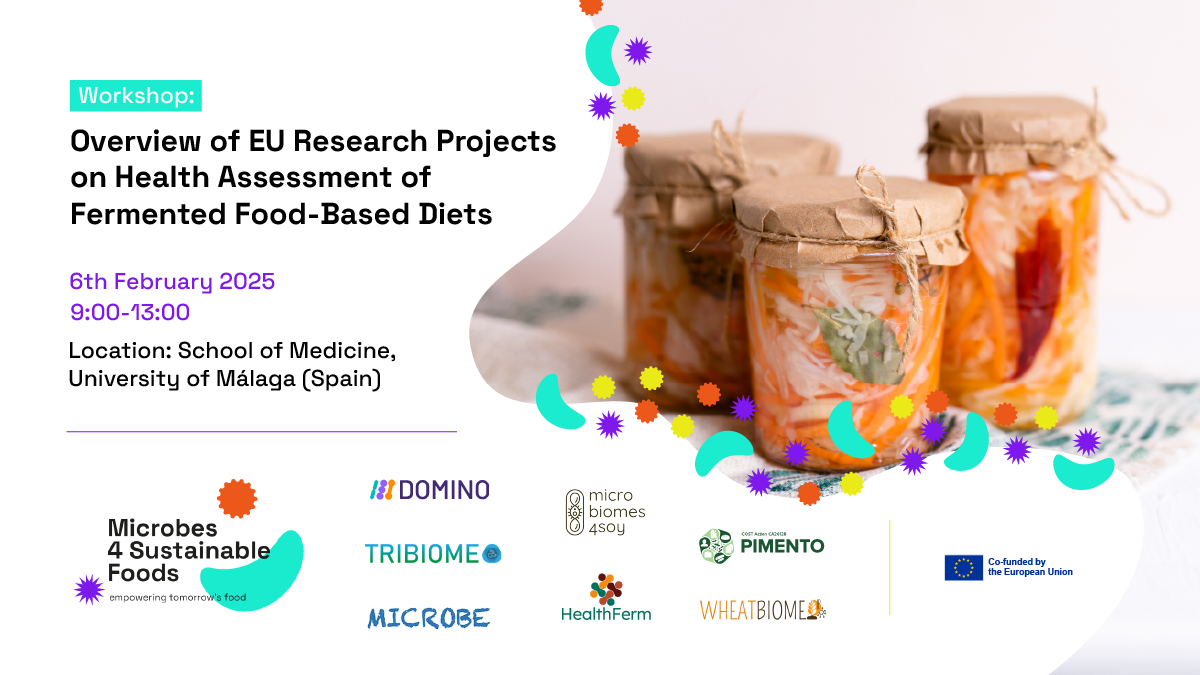Microbes4SustainableFoods Cluster Secures €45M+ in EU Funding to Drive Innovation in Sustainable Food and Health
Last Updated : 05 February 2025Brussels, February 5th, 2025 – As the global appetite for sustainable food options continues to grow, microbiome-based innovations such as fermented foods are emerging as a powerful tool for improving human health and protecting the environment. Leading the charge in Europe is the Microbes4SustainableFoods (M4SF) Cluster, a collaboration of EU-funded projects driving cutting-edge research on fermented foods and food system microbiomes to shape a healthier, more sustainable future. M4SF welcomes two new projects (MICROBIOMES4SOY and MICROBE) to the cluster to strengthen its mission.
"Federating the different projects in the field of food fermentation and food systems is an important task to foster innovation, share knowledge and good practices to reach our long-term objectives. We could all together pave the way for future foods and propose new programs of research and development," said Christophe Chassard, research director at INRAE and PIMENTO project coordinator.
Key Objectives of the M4SF Cluster:
- Unveiling the Health Benefits of Fermented Foods: Exploring how fermented foods impact human health and the gut microbiome, paving the way for nutrient-rich, microbiome-friendly diets.
- Combining Human Wellbeing with Sustainability: Bridging the gap between better nutrition and eco-conscious food systems to benefit people and the planet.
- Positioning Europe as a Leader in Microbial Foods: Showcasing Europe’s innovation in microbial food systems, while celebrating regional diversity and local food production.
- Revolutionising Agricultural Sustainability: Demonstrating the role of soil-plant microbiomes, particularly in wheat and soya, to enhance circular economy practices and sustainable agriculture.
Innovative Solutions Delivered by the M4SF Cluster:
- Centralised Microbe Database: A comprehensive resource cataloguing microbes from a variety of fermented foods to aid scientists and producers.
- Fermented Food Consumption Insights: Data-driven analysis of the diversity and consumption patterns of fermented foods across Europe.
- Collaborative Innovation Forum: A platform connecting scientists and producers to foster innovation in the fermented food sector.
- Human Health Research: Studies investigating the specific health benefits of fermented foods.
- Enhanced Nutritional Quality: Leveraging fermentation techniques and microbiome-based insights to improve the nutritional value of food and animal feed.
- Plant-Based Fermented Food Development: Exploring new possibilities for microbiome-friendly, plant-based fermented foods.
- Enhancing Agricultural Management: Investigating the role of plant microbiomes in influencing environmental sustainability, yield stability, and food safety and quality.
Expanding the M4SF Mission
On February 6th, M4SF will convene in Málaga, Spain, for the Second Forum on Fermented Food to deliver an 'Overview of EU Research Projects on Health Assessment of Fermented Food-Based Diets' workshop. This workshop will mark a milestone as the cluster welcomes new projects and gathers leaders from academia, industry, and research to promote fermented foods and microbiome-based food innovation in Europe.

The M4SF Cluster was initially founded by five EU projects—DOMINO, TRIBIOME, WHEATBIOME, HEALTHFERM, and PIMENTO Cost Action. With the addition of MICROBIOMES4SOY and MICROBE, the cluster strengthens its mission to advance microbiome research for the benefit of human health and the environment.
Join the Movement
"Joining forces will allow us to communicate better and share the results of the different projects, propose new solutions based on these results and spread them everywhere in Europe and beyond," asserts Christophe Chassard. "The cluster is open to every Horizon Europe project and initiative in the field of food fermentation and food systems sharing this common vision for the future"
The M4SF Cluster is committed to reaching diverse audiences through workshops, events, webinars, and social media campaigns, ensuring that its findings inspire meaningful change in sustainable food production and consumption.
For more information, follow the initiatives of M4SF online and explore the pioneering research driving the future of microbial foods: DOMINO, TRIBIOME, WHEATBIOME, HEALTHFERM, PIMENTO Cost Action, MICROBIOMES4SOY, and MICROBE.
ENDS
About M4SF
The cluster consists of seven projects that share a commitment to advance sustainable food systems, health and environmental resilience through the study of microbiomes along food system value chains.
Projects involved in the Cluster:
- DOMINO: Investigates how fermented foods shape the gut microbiome and promote health while developing sustainable, plant-based fermented foods.
- HealthFerm: Explores the health benefits of plant-based fermented foods through human studies, designing diets that optimise gut microbiome health.
- PIMENTO: Aims to position Europe as a leader in microbial foods by advancing science, promoting diversity, and fostering local production.
- WHEATBIOME: Unlocks the potential of wheat microbiomes to improve agricultural sustainability, biodiversity, and food system resilience.
- TRIBIOME: Studies soil, plant, animal, and human microbiomes to transform food systems in line with the EU Green Deal and sustainability goals.
- MICROBIOMES4SOY: Focuses on the microbiomes along the soya bean food value chain to improve outcomes in agricultural management, human health and nutrition, and sustainable aquaculture feeds.
- MICROBE: Advances microbiome research and standardisation to support the development of business opportunities and technical solutions.
Contact
For media and further information, please contact:
- Debora Serra (EUFIC): Project communication contact - debora.serra@eufic.org
- Stéphane Chaillou: France’s National Research Institute for Agriculture, Food and Environment (INRAE) and Domino’s Project coordinator - stephane.chaillou@inrae.fr